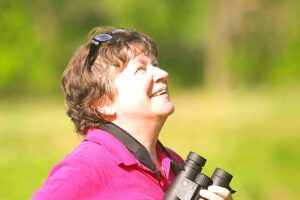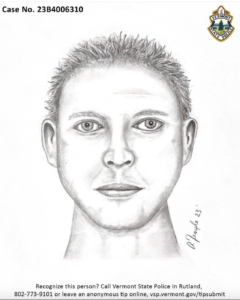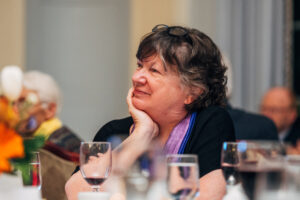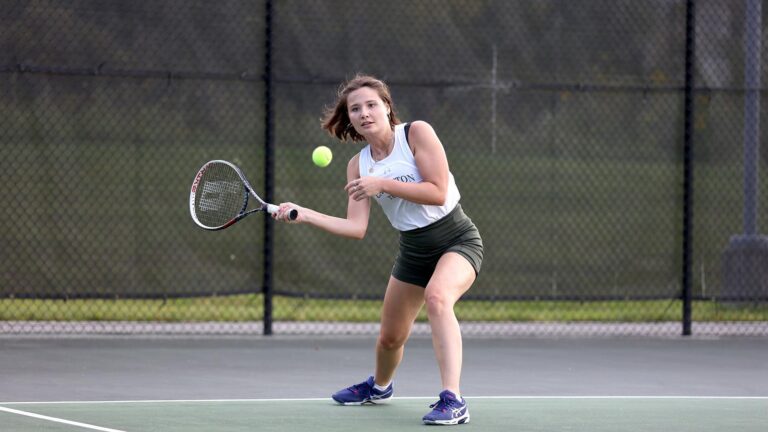Rail trail death strikes the heart of Castleton community

Castleton stood still on Thursday, Oct. 5.
The loss of a member of the community so suddenly, tragically, and unexpectedly forced a moment of contemplation for many.
The Castleton Rail Trail, home to numerous morning walks and evening strolls, remains in silence, void of the crunch of shoes and soft conversations.
More than a week after the tragic murder of former Castleton University Associate Academic Dean Honoree Fleming, 77, it remains cemented in the minds of the Castleton community as they mourn her loss and try to regain their footing following this emotionally and socially destabilizing event.
“I urge those who didn’t know her to read about her, learn about her, because she had many, many wonderful traits that should be emulated by us all. She was a super bright, very compassionate, caring person. She was highly ethical,” said Joe Mark, former Academic Dean of Castleton University, at an Oct. 9 reception in her honor in the Campus Center.
Fleming was killed in a shooting on Oct. 5 as she walked along the Delaware & Hudson Rail Trail, a mile south of the Castleton Campus, police say. Vermont State Police and Castleton Police are continuing to search for the person of interest; a 5’10 male with short red hair, whom they produced a sketch of last week. State Police have received over 200 tips since Fleming’s death and say the investigation is ongoing.

Fleming was a former professor and retired dean at Castleton, but she began her academic career teaching biochemistry at Middlebury College before moving to Trinity College in Burlington. She was married to Pulitzer Prize winning author, Ron Powers, though her academic merit stands independently, having completed a 40-year investigation into her scientific sphere of curiosity on cell growth. The couple shared two sons, Dean and Kevin, though Kevin passed away in 2005 from suicide after struggling with schizophrenia, as detailed by Powers in his book, “No One Cares About Crazy People.”
The Castleton community’s reaction to the incident reflects both fear, sorrow, and anxiety. The swarming of law enforcement to the small village nestled in the comfort of the green mountains left many on edge.
“Secure in place is usually not a good sign, so, anxiety, general anxiety,” said Executive Vice President of the Student Government Association, Adsel Sparrow, when asked about the feelings of students.
Central to the response of students was the social media bubble that erupted with rumors and theories, because most students were home for the October break when the killing happened.
However, while these sites have the ability to connect people, they also hold the potential to “exacerbate anxiety and fear,” Sparrow said.
Junior Texan, Leonard Brice, while shocked by the proximity of the event, believes that moving forward will allow Castleton to continue growing and thriving.
“If I ever go on the trail again, I’ll be more conscious, but I’m not all shocked that things have gone back to normal after the situation. Life still continues, and I think if we hit pause, it’ll set everybody back. But I still feel bad about what happened.”
Perry Ragouzis, president of the Castleton SGA, touched on his own fear for students.
“As tragic and terrible as this is, I don’t want it to be so demoralizing that students feel like campus isn’t safe” he said, while adding that he realizes “emotionally, it’s (Castleton is) not safe.”
Rutland local and sophomore Samera Rideout was disheartened by the situation, but does not feel it has greatly impacted a sense of safety.
“I’m not scared, like I’m not nervous at all. It feels very gloomy and eerie around campus, which is because that’s not typically the environment I’m used to,” Rideout said. “Whenever they finally catch this dude, hopefully the vibe on campus can finally go back to normal but until then I think campus will continue to be a saddened place.”
Castleton’s Associate Director of Health and Wellness Martha Coulter points to the event as a signal for the Castleton community to connect, rather than disperse.
“Our inclination is to isolate, and to withdraw, and (we must) do the opposite. To spend time with people and connect with people who we can be real with and share what is going on with us,” she said.

Coulter’s role within the Health and Wellness Center has allowed her to understand that in the aftermath of tragedy, “it brought up for many students, tragedies in their own lives.” Certainly, the ability for this event to transcend the confines of a single, isolated incident and resurface personal traumas raises concern for the mental wellbeing of the student body, faculty, and staff, she said.
Meeting the needs of the student body is of central concern for the SGA, and Ragouzis said he’s working to establish a safety net of communication and openness. A foundation of support is fundamental to the recovery of Castleton, Ragouzis said, noting the paralysis that can be felt as a young American.
“I think that being young in America can sometimes be in a way, restrictive, and feel like you don’t have a voice and feel like you don’t have the capacity to make a change. When we feel restricted it’s harder to heal, it’s harder to learn, grow. So, I would hope that the student government becomes an integral part of the healing process. It’s not going to be any one group,” he said.
Likely lingering in the minds of the Castleton community are the recent merger changes that have dichotomized the university body. Fleming’s tragic passing has acted as a catalyst to reconnect the broader community.
“Everyone is so deep in their trenches in how they identify in terms of what changes are happening. Those changes are important, but for me especially, this really launched me back and gave me a kind of 10,000-foot view of what’s happening, what’s important, why am I here, why are we here, what are we doing?” he said.
Powers, husband of the late Honoree, expressed deep sorrow on his Facebook page, while also recognizing the outpouring of emotional support as the community employed the platform to connect digitally. Powers posted that the responses “have captured her beautiful essence with degrees of accuracy that stun me as I read them, and read them again. I am in awe of all of you. You have understood and cherished her luminous soul, and that is (part of) the reason I can tell myself that even though the brilliance of her scientific vision was not fully recognized in her lifetime, dear Honoree did not live in vain. She lifted every life that her life touched.”
Philosophy professor Brendan Lalor experienced this personal touch during his interview process when he came to Castleton University.
“During my interview, when I was coming to Castleton for this job, she was the one I developed the most meaningful connection with,” Lalor said. “In my experience with her, she was a real force for humanity, having compassion. So, it was hard for me to imagine why anyone would kill her.
“I remember her being really interested in my relationship with my children, asking me about my son while being genuine about it and it was like wow, this a caring person,” Lalor explained.
The Castleton community will certainly take time to heal, as the loss of a valuable member both echoes an ongoing national level crisis and remains in local minds and hearts. Castleton, and all lives Fleming touched, have lost a “right-hand woman,” Mark said.
Spartan reporter Wyatt Jackson contributed to this report.







